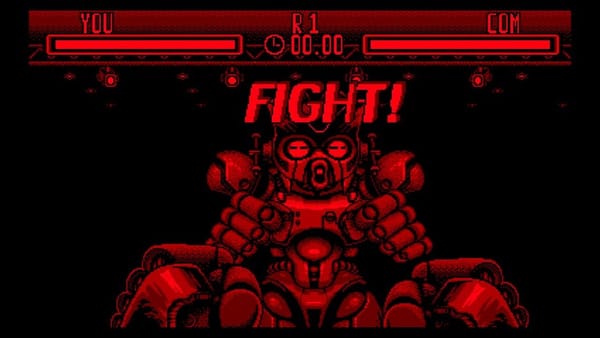#336: Boss battles
The worst man in videogames is At It Again.

I’ve had some pretty wretched bosses over the years. There was the CEO who constantly went on about how well our company was doing, trumpeting her colossal success at turning our fortunes around, before sending us word that no, we couldn’t have £20k a year for a new staff writer, because the landscape for print mags was so tough. There was the managing director who spent his days gakked up to the eyeballs, and had a very public affair with a young account manager. We all had to pretend it wasn’t happening when his wife came along to company functions. And for a while in my 20s I worked, horror of horrors, for my parents. (They were excellent bosses as it goes, and I got away with murder — I could probably have got away with the whole gak/account manager thing, now I think of it, if I’d chosen that path — but still. Parents.)
The videogame industry has its share of horrible bosses, of course, and whenever a Wilson or Spencer etc does something wretched, our thoughts most naturally turn to the people most directly affected by it. We think of the workers who wake up one Monday morning expecting a normal week at work, then find themselves out of a job a couple of hours later, cast out into the worst employment market the industry has ever known for the sake of the company’s share price. But what about the people who stick around? The ones who can only look on in horror as beloved colleagues are sent packing, projects are cancelled, or some wretched C-suite goober says or does something so awful you could scream?
How, I wonder, did the folks at Bungie, slaving away on some fresh Destiny #content treadmill or trying to knock Marathon into shape, feel when news broke about company president Pete Parsons’ multimillion-dollar classic-car collection, days after he’d laid off 220 people? How did the workers at Unity deal with then-CEO John Riccitiello calling the game developers they served “fucking idiots”? How did the people who escaped the Xbox axe feel about Phil Spencer trumpeting his division’s great successes — its record player numbers and engagement hours and all that — in the same breath as his announcement of yet another round of job cuts? I feel for these people, I really do. I have no idea how they do it.
However, the sorrow and sympathy I feel for the workers at Bungie, Unity, Microsoft and just about every other game-industry company with a godawful sociopath for a boss is nothing compared to what I feel for people who work for Gearbox, whose co-founder, CEO and god-knows-what-else Randy Pitchford has regrettably been At It Again this week. Pitchford is a particularly hellish breed of leader. He has a frighteningly high opinion of himself, has a proven distaste for the truth, and has survived so many scandals, fuckups and foot-in-mouth moments that he has effectively proved himself immortal. Worst of all, he simply will not shut the fuck up, ever. To recap his many gaffes and mishaps would take us all day, but to briefly skim over the best bits: he left a USB stick containing company secrets and, allegedly, barely legal porn at a Medieval Times; he fabricated a Gearbox origin story that alleged one of his company’s most important partners was led by a lacklustre poker player; most recently, he briefly became not-Twitter’s main character — no mean feat these days — for saying “real fans” would “find a way” to pony up $80 for Borderlands 4. Simply seeing this bloke in the headlines makes me want to break something. Can you imagine what it’s like working for him?
Borderlands 4 launched last week, at a comparatively modest $70 — a result, I like to think, of bosses at 2K realising Pitchford had made such a colossal mess of the messaging that they had no choice but to lower the price — and it’s been getting a bit of a kicking on Steam, with performance problems and crashes sparking grumpy user reviews and the dreaded ‘Mostly Negative’ rating. (A hasty patch, an optimisation guide, and the game itself apparently being pretty good have pushed the rating up to ‘Mixed’ over the last few days.) Now, this is hardly the first game to suffer a bumpy takeoff. It's now so common a sight that the guidelines for what to do when you find yourself caught in the crosshairs are pretty much carved in stone. First and foremost, you apologise to players who are having a less-than-perfect experience. You explain your preliminary findings, and detail the steps you're taking to remedy the situation. You suggest a few tweaks that might stabilise performance for your players in the meantime, and ask for their patience. That’s how this goes, right? We’ve seen it before, a hundred times or more, and will no doubt see it again.
Randy Pitchford, however, is simply different. When others zig, he zags; when others admit their mistakes and apologise, he talks about magic for like two hours and then makes some shit up. This time he's logged on to not-Twitter to adopt the mantle of the world’s most needlessly passive-aggressive helpdesk technician, while retaining his usual air of a massively overpromising used-car salesman who knows you can see through his bullshit, but has no intention of dropping the facade. Pitchford reckons this is all your fault; he insists Borderlands 4 is “pretty damn optimal” and that people complaining about the game’s stability or performance just don’t know how to use a PC. “Borderlands 4 is a premium game made for premium gamers,” he honked, in response to one of the many, many not-Twitter users who took exception to his very long, and very annoying, thread. “Some [players] need to learn how their PCs work at the high end [...] If you’re trying to drive a monster truck with a leaf blower’s motor, you’re going to be disappointed." Righto!
“The software is doing what we want without wasteful cycles on bad processes,” he continued, which feels like a rather optimistic way of describing a game the boffins at Digital Foundry called “worse than usual for an Unreal Engine 5 game”, that PC Gamer described as “a big, bold world of stutters and disappointing framerates, even on the best PC hardware money can buy”, and that crashed three times in the 90 minutes I played of it before requesting a refund on Steam. Dimbulbs, the lot of us! We are, it transpires, bad at the computer. At least, in amongst all the suggestions that his customers are idiots, Pitchford finds a way to dangle the spindliest of olive branches. “If you think you have a different kind of issue that is real, that I haven’t spoken to here, PLEASE reach out to Customer Service,” he said. “I have personally done some CS for Borderlands 4 and have helped a lot of people.”
Like I said: imagine working for this clown. Imagine being on the customer-service team when Mr Medieval Times comes swinging in, like, gimme a login, I’ll show these moaning know-nothings who’s boss. Picture the poor engineering teams who now have to scope out a roadmap of fixes for an overlord who has publicly insisted Borderlands 4 is “pretty damn optimal”, and the comms and community teams who have to come up with a way of messaging it all to the public. Imagine being literally anyone at Gearbox, finally sending a game several years in the making out into the world and having the conversation around it dominated by the snide social-media witterings of your thin-skinned, unsilenceable CEO. What are you supposed to do? Leave? Gearbox’s home of Texas isn’t exactly awash with triple-A game studios, and in any case the job market has never been so dire. So you plough on, finding fresh ways to get through the day’s work without cringing yourself inside out, trying not to think about the fact that everything you do is in the service of further enriching the game industry’s loudest dumbass. My sympathies. Truly.
Perhaps there’s hope. Gearbox was bought outright last year by Take-Two Interactive, whose subsidiary 2K has published the Borderlands series since its inception. It has, until recently, been something of a hands-off relationship; 2K might have been the one releasing the games, but the IP belonged to Gearbox, and Pitchford was more than happy to be its most punchable public face. No doubt the bigwigs at 2K have been watching his conduct over the last few days in horror; no doubt they also realise that they finally have the power to do something about it. Might Randy Pitchford’s big dog era be coming to an end? You know, I reckon it just might. At least he’s got that customer-service experience to fall back on.
Hey! If you enjoyed today’s edition of Hit Points, why not become a paid subscriber? Just £4/$5 a month gets you a weekly email about the game industry’s latest goings-on, access to the full archive, and entrance to the subscriber-exclusive Hit Points Discord, aka the last good place on the internet. Join us! Please?





